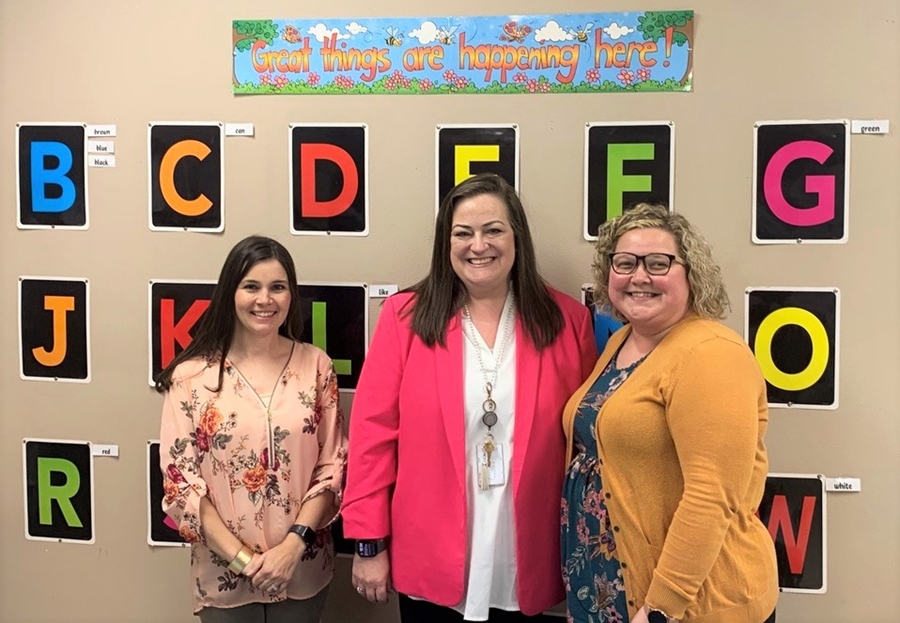
S.C. Tucker Elementary in Danville earned the "Beating the Odds" award this year for having the highest overall student growth among Arkansas schools serving a high percentage of students living in poverty.
Their recognition from the U of A Office for Education Policy includes being the highest math growth school and the second highest in English Language Arts growth.
This is the first school in Arkansas to be led by consecutive IMPACT Arkansas Principal Fellows, said John Pijanowski, the original creator of the program and principal investigator at the U of A. The purpose of IMPACT is to identify aspiring leaders in rural, underserved Arkansas schools and provide them with high-quality, job-embedded learning experiences and mentoring to build leadership capacity within their districts.
The College of Education and Health Professions partnered with the Walton Family Foundation to launch the IMPACT Arkansas Principal Fellows program in 2014. IMPACT graduates from the first six cohorts include 123 fellows, representing 100 distinct schools in 67 of Arkansas' 233 school districts. The innovative leadership preparation program's impact throughout the state grows with every new cohort. Students in the program's seventh cohort will graduate in December 2023. These leaders from just a single cohort are estimated to impact more than 800 teachers and 8,000 students.
The IMPACT program addresses the principal shortage, high turnover rates and limited leadership development and support infrastructures that are heightened by geographic isolation and funding disparities in rural, high-poverty communities.
That leadership is definitely on display at the small Danville elementary school.
Pijanowski, a professor of educational leadership in the College of Education and Health Professions; Ed Bengtson, head of the college's Department of Curriculum and Instruction; and John Bacon, IMPACT executive director, recently visited the elementary school to congratulate the team for their "Beating the Odds" award. The school's principal — IMPACT alum Jenni Phomsithi — and the school district's superintendent, Kim Foster, shared about their successes and gave them a campus tour.
As Bengtson noted, "Jenni and her leadership team have taken every aspect of being a small school and leveraged it to become a strength."
Foster said the school's culture has flourished under her leadership. "She is data-driven, more than willing to try new things, transparent and honest," Foster said.
Phomsithi, who took over as principal from IMPACT Cohort 2 graduate Kelly Klober, credited her IMPACT experience with polishing her leadership skills. "Everything that is poured into the IMPACT Fellow experience is amazing — classes, coaches, virtual meetings — but the binding piece is the collaboration and relationships that develop," she said. "A lot of the magic of the IMPACT program is in the relationships."
She still communicates with her coaches, and the cohort still meets as a group. "There were always tough, honest conversations with coaches and a lot of feedback," she said. "I loved how they changed the learning experience to adapt to my needs. I carry much of what I learned with me every day, including how I problem-solve with groups and have difficult conversations."
She's passing those leadership lessons down to the teachers at S.C. Tucker Elementary. "Jenni constantly reinforces to us. She says, 'You're the expert in your classroom. You tell me what is going to work,' and that helps teacher morale," said teacher Lindsey Rylee. "I can have open, transparent conversations with her. She considers me the expert in my classroom and wants to give me the tools to be successful. Any time I've asked for dedicated time, she's said, 'I know if you're asking for this, that you need it.'"
IMPACT Executive Director John Bacon noted, "The school's ESSA performance in 2022 exceeded their score from 2019. Meaning, performance has actually improved in comparison to pre-COVID performance levels. That is a phenomenal accomplishment." Phomsithi was a classroom teacher before taking over as principal and previously served as director of secondary instruction and federal programs coordinator for the district.
IMPACT graduates have become instructional facilitators, assistant principals or principals. The program, which is currently in its third funding cycle from the Walton Family Foundation, has proven successful as a teacher-leader pipeline for the highest needs schools in the state. Graduates commit to staying in their current school for two years post-graduation after earning their M.Ed. in Educational Leadership from the U of A. Nearly 100% of IMPACT graduates remain in Arkansas schools, and 81% stay in schools with poverty status.
The defining features of IMPACT's success story include mentoring support from coaches; on-site supervisors, faculty and cohort peers; and leadership development that extends into the early years of practice. As Phomsithi noted, the learning doesn't end when the 18-month program is over. Fellows join an active group of alumni who give back to the program and serve as a professional learning network for one another.
Pijanowski, who teaches educational leadership classes, said, "Our approach to educational leadership preparation has always been to center the power of social learning. We value learning from each other and engaging students in powerful and diverse field experiences throughout their coursework."
Topics
Contacts
Shannon G. Magsam, director of communications
College of Education and Health Professions
479-575-3138,